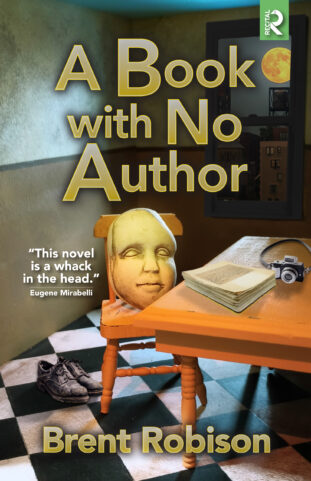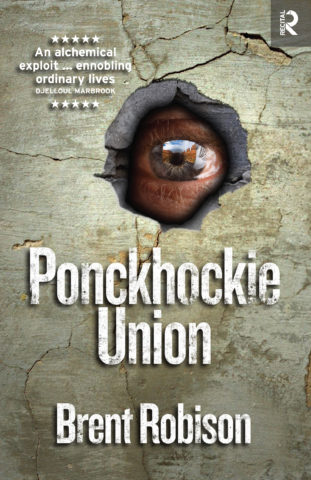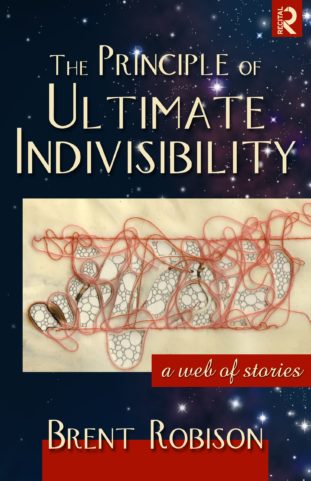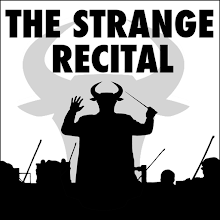As I look further into both ancient and modern philosophies of
Nonduality, I'm feeling obsessed by the challenge of embodying those ideas in the fiction I'm writing. Just creating the kinds of stories that once satisfied me (a sort of literary humanist realism) is no longer enough. Besides believability, poignance, and craft, I need something deeper, a sense of meaning that hides behind "reality" like a face behind a mask.
In my story collection,
The Principle of Ultimate Indivisibility, I began to peek behind that mask by linking characters and their separate stories in subtle ways, implying the
Net of Indra as a vision of background truth. In my novel-in-progress, I hope to go further, manifesting the mysterious workings of a Unified Field that paradoxically contains the dualities necessary for not only human drama but also the language required to tell the stories. I'm inching forward like a man newly blind.
But I'm grateful to have guideposts, in the form of old friends, favorite authors. With a buzz of recognition, I'm discovering new explanations for the elements that hooked me long ago on the early work of
Paul Auster--in particular,
The New York Trilogy. As I walked the streets of Manhattan at the beginning of the '90s, my head was often full of the deliciously strange mysteries in that slim volume, which is made up of three novellas that interconnect like an Escher illusion. In
City of Glass, a novelist poses as a detective and gets entangled in a case that consumes him. In
Ghosts, a private eye's surveillance of his subject leads him to existential crisis. In
The Locked Room a man obsessively follows his missing friend into a labyrinth of blurred identity. This is work that borrows conventions from mystery fiction, then proceeds to subvert the genre--by some estimations failing to satisfy, by others succeeding through transcending predictable outcomes. The trilogy can be seen as a prototype of "metaphysical detective fiction," in which the world is one of questions, not answers; interpretations, not solutions; and the sleuth is seeking not "Whodunit" but "Who am I?"
Much academic ink has already been spilled dissecting Auster's work, much of it dense analysis of postmodern complexities that are intriguing but don't lead beyond the ivory tower. My reading has just scratched the surface, but occasionally I've spied threads of higher meaning that I'm attempting to trace here. I won't footnote the following ramblings, but you can follow the links if you want to go deeper.
One of Auster's primary themes, the primacy of language-based narrative, comes out of
Lacanian psychoanalysis: (in Wikipedia's words) "We observe the world through our senses but the world we sense is structured (mediated) in our mind through language. Thus our subconscious is also structured as a language. This leaves us with a sense of anomaly. We can only perceive the world through language, but we have the feeling of a lack. The lack is the sense of a being outside of language. The world can only be constructed through language but it always leaves something uncovered, something that can not be told and be thought of, it can only be sensed."
For me, this is a pointer toward a nondual Absolute that cannot be captured in language, since language is inherently dualistic.
Here are a couple more writers who explore the language issue, and take it even further:
Alison Russell, in
Deconstructing The New York Trilogy: Paul Auster's Anti-Detective Fiction leans on
Jacques Derrida when she says: "Logocentrism, the term applied to uses and theories of language grounded in the metaphysics of presence, is the "crime" that Auster investigates in
The New York Trilogy. In each volume, the detective searches for "presence": an ultimate referent or foundation outside the play of language itself. This quest for correspondence between signifier and signified is inextricably related to each protagonist's quest for origin and identity, for the self only exists insofar as language grants existence to it." And
Richard Swope’s article (recommended) in the journal
Reconstruction adds, "the questor can never arrive at his desired destination, for in this world signifiers are not attached to signifieds, while the distinction between self and other no longer holds."
Presence... the quest for identity... no distinction between self and other... hmm... sounds familiar if you read current nonduality writings.
In an article called
Mirrors of Madness,
Steven E. Alford writes, "
The New York Trilogy holds a mirror up to our own madness--the assumption of our hermetic individuality.... " and "The particular contribution of
The New York Trilogy is that in each story, we see the realization of the "substancelessness" of the self in its psychological dimension...." And he quotes Anthony Paul Kerby,
Narrative and the Self: "One cannot become 'I' without an implicit reference to another person, an auditor or narratee--which may be the same subject qua listener. 'I' functions in contrast to 'you' in much the same way as 'here' refers linguistically to 'there' rather than any fixed location."
We are not sealed off from each other... the self has no substance... as here is there, so I am you... hmm... the echoes continue.
Interesting how much all of this sounds like a favorite website of mine,
Science and Nonduality. Here's the description of their annual conference:
It seems agreed upon by spiritual masters of all traditions that the main reason for our suffering is the identification with the “I” and the way to dissipate this pain is to merge with what is beyond the “I”, to merge the looker with what is looked at. Science, on the other hand, can help us to understand how we construct and experience the “I”, as well as the states beyond it. ... Some of the topics we will explore are:
--Observing and experiencing how the “I” arises (Neuroscience, Psychology)
--Looking at the Macro (Cosmology) and the Micro (Biology, Quantum Theory) to reframe the “I” and give a different perspective and bring it “beyond”
--The collapse of concepts, identifications and models (Experiential)
--Glimpses of nondual awareness, no-state states beyond words and ideas (Satsang, Poetry, Art, Music and more...)
To repeat a reference from an
earlier post:
Alan Watts said that “I” is just the universe “eyeing.” We have met the vastness, and it is us.
Who am I? Auster asks the unanswerable question by blurring the distinctions between author, narrator, and character. In
City of Glass he introduces a character named Paul Auster who is virtually identical to his “real” self, and gives a twist ending that leaves the identity of the story’s narrator entirely unknown. Maybe that narrator is the same as in the subsequent novellas, maybe not. You decide. It meshes well with a book I just finished,
Biocentrism by Robert Lanza and Bob Berman. They use quantum physics to support the conjecture that life creates the universe rather than the other way around. That there is no reality without a conscious observer. You are the author, which is to say, each of us is the author. The universe is omnicentric, as cosmologist
Brian Swimme has stated.
In the early '90s when I first read
The New York Trilogy, none of this was in my awareness. I only knew that there was a sense of metaphysical or ontogical mystery woven into the fabric of these three stories that I found incredibly compelling. To give a thorough sample, to really make you feel it, would require quoting the whole book. But here are a few clippings that give a hint of what Auster was doing that grabbed me then and sticks with me still.
From
City of Glass:
[Why the hero, Quinn, likes detective novels] Everything becomes essence; the center of the book shifts with each event that propels it forward. The center, then, is everywhere, and no circumference can be drawn until the book has come to its end.
...
Each time he took a walk, he felt as though he were leaving himself behind, and by giving himself up to the movement of the streets, by reducing himself to a seeing eye, he was able to escape the obligation to think, and this, more than anything else, brought him a measure of peace, a salutary emptiness within.... By wandering aimlessly, all places became equal and it no longer mattered where he was. On his best walks he was able to feel that he was nowhere. And this, finally, was all he ever asked of things: to be nowhere.
From
Ghosts:
For in spying out at Black across the street, it is as though Blue were looking into a mirror, and instead of merely watching another, he finds that he is also watching himself.
...
Something happens, Blue thinks, and then it goes on happening forever. It can never be changed, can never be otherwise.
From
The Locked Room:
My true place in the world, it turned out, was somewhere beyond myself, and if that place was inside me, it was also unlocatable. This was the tiny hole between self and not-self, and for the first time in my life I saw this nowhere as the exact center of the world.
This discussion doesn’t approach Auster’s other writings that build on the same themes, nor does it touch the issue of Chance, that slippery sliding scale of coincidence vs. fate, which is another key element in the
Trilogy and most of Auster’s other work. But for now, it’s all I’m able to tackle.
For a couple of years now, I’ve been fascinated by how nonduality can be expressed in literary storytelling. This little essay has been part of that study. So... it seems my next task, now that I’ve ingested so much theory, is to drop it all and just write.
In other words: to get on with being the Author, and to observe the universe as I create it.
















